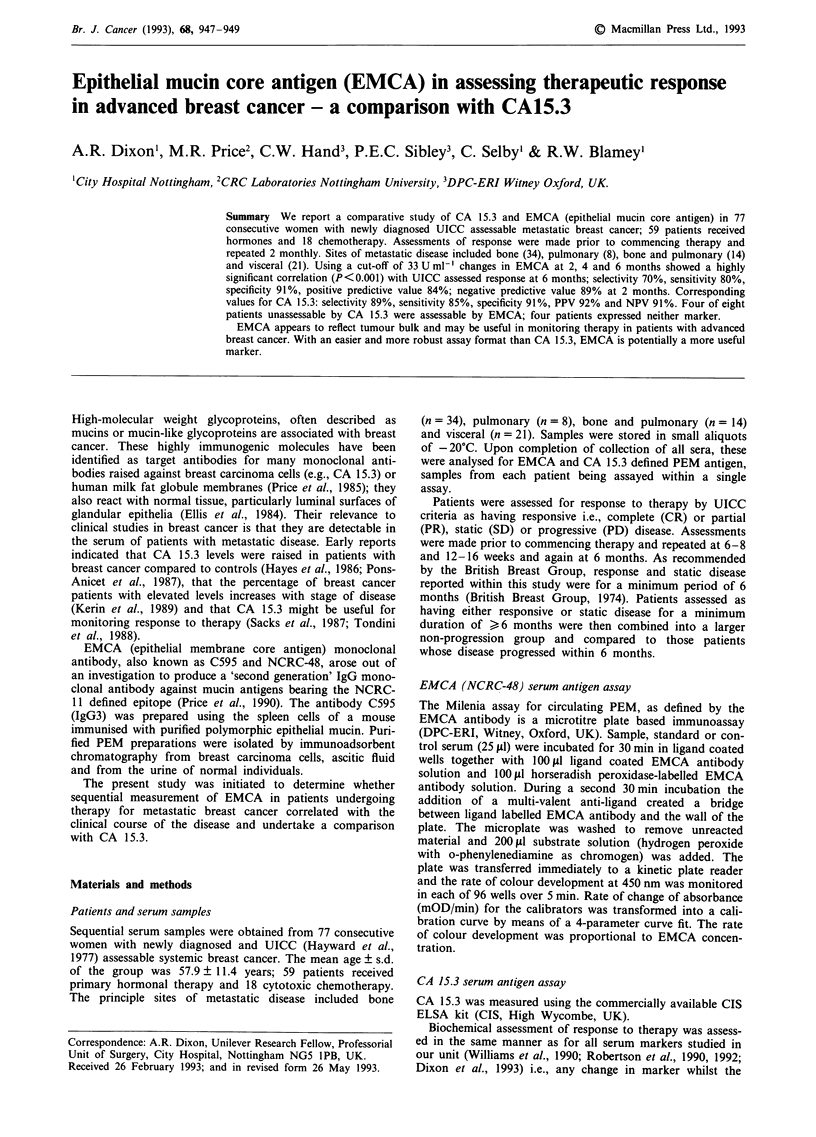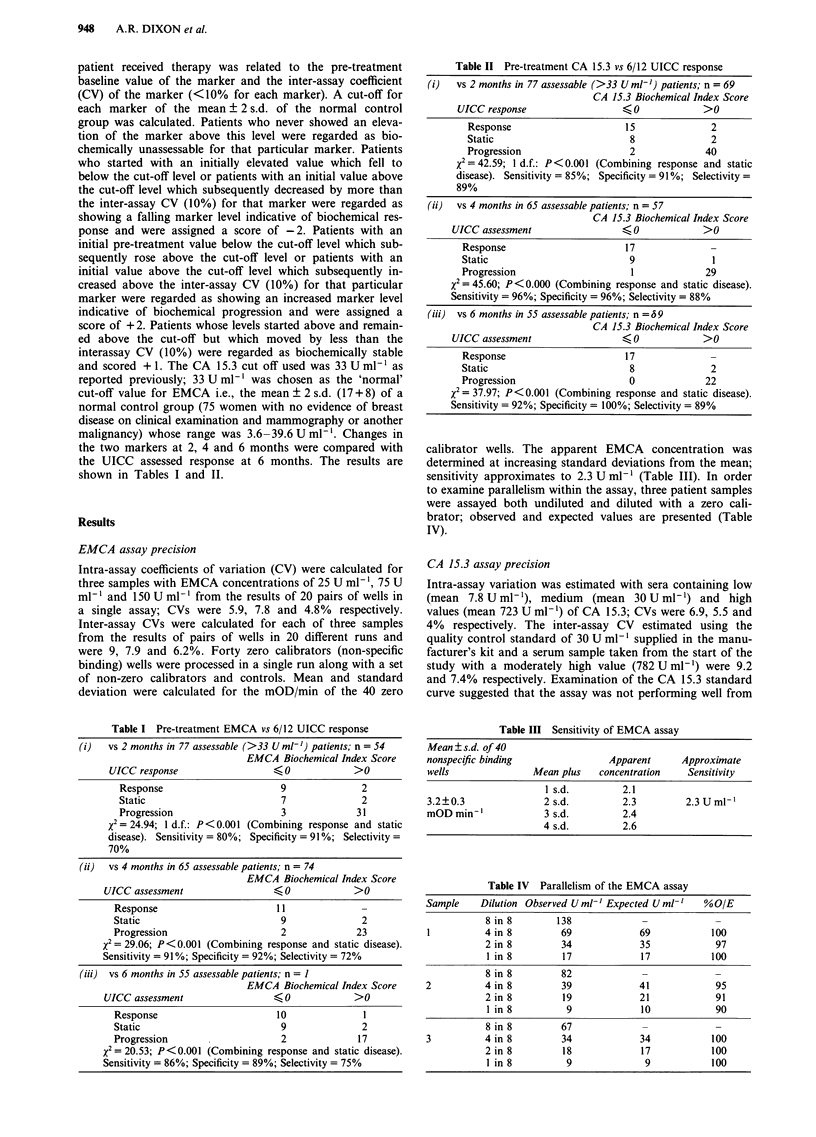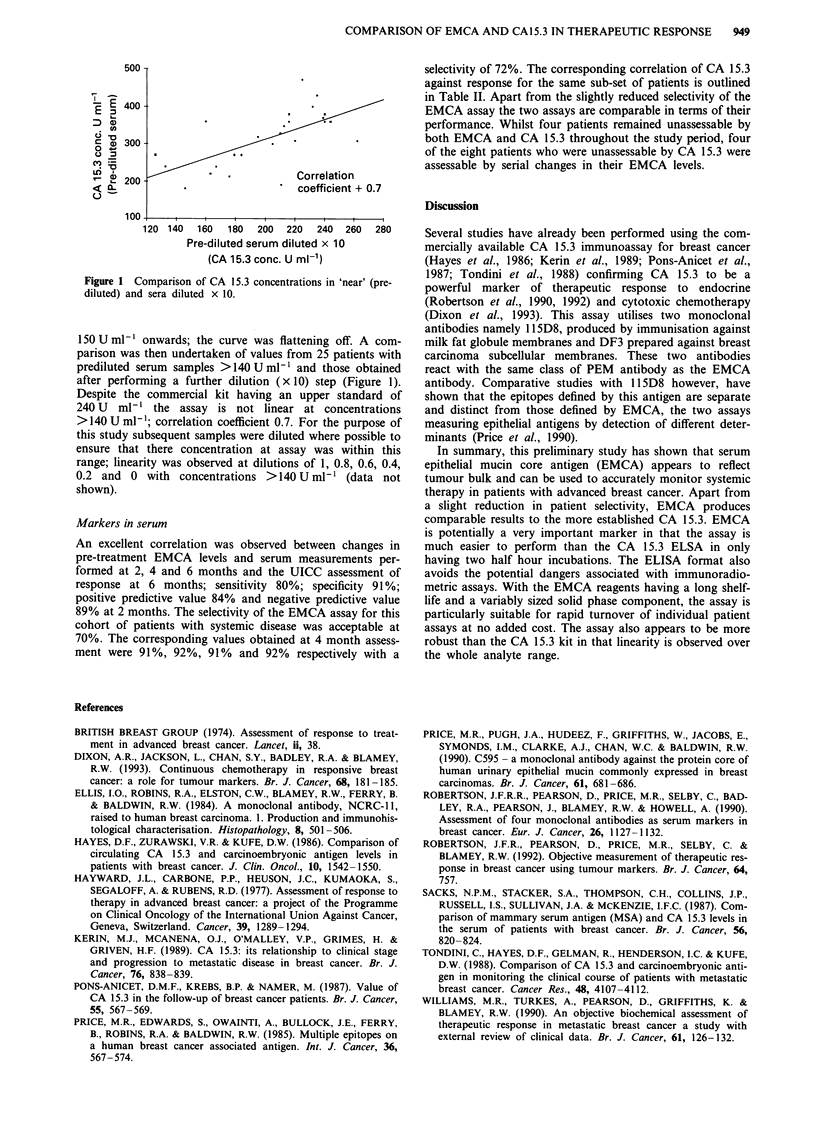Abstract
We report a comparative study of CA 15.3 and EMCA (epithelial mucin core antigen) in 77 consecutive women with newly diagnosed UICC assessable metastatic breast cancer, 59 patients received hormones and 18 chemotherapy. Assessments of response were made prior to commencing therapy and repeated 2 monthly. Sites of metastatic disease included bone (34), pulmonary (8), bone and pulmonary (14) and visceral (21). Using a cut-off of 33 U ml-1 changes in EMCA at 2, 4 and 6 months showed a highly significant correlation (P < 0.001) with UICC assessed response at 6 months; selectivity 70%, sensitivity 80%, specificity 91%, positive predictive value 84%; negative predictive value 89% at 2 months. Corresponding values for CA 15.3: selectivity 89%, sensitivity 85%, specificity 91%, PPV 92% and NPV 91%. Four of eight patients unassessable by CA 15.3 were assessable by EMCA; four patients expressed neither marker. EMCA appears to reflect tumour bulk and may be useful in monitoring therapy in patients with advanced breast cancer. With an easier and more robust assay format than CA 15.3, EMCA is potentially a more useful marker.
Full text
PDF


Selected References
These references are in PubMed. This may not be the complete list of references from this article.
- Dixon A. R., Jackson L., Chan S. Y., Badley R. A., Blamey R. W. Continuous chemotherapy in responsive metastatic breast cancer: a role for tumour markers? Br J Cancer. 1993 Jul;68(1):181–185. doi: 10.1038/bjc.1993.310. [DOI] [PMC free article] [PubMed] [Google Scholar]
- Ellis I. O., Robins R. A., Elston C. W., Blamey R. W., Ferry B., Baldwin R. W. A monoclonal antibody, NCRC-11, raised to human breast carcinoma. 1. Production and immunohistological characterization. Histopathology. 1984 May;8(3):501–516. doi: 10.1111/j.1365-2559.1984.tb02360.x. [DOI] [PubMed] [Google Scholar]
- Hayes D. F., Zurawski V. R., Jr, Kufe D. W. Comparison of circulating CA15-3 and carcinoembryonic antigen levels in patients with breast cancer. J Clin Oncol. 1986 Oct;4(10):1542–1550. doi: 10.1200/JCO.1986.4.10.1542. [DOI] [PubMed] [Google Scholar]
- Hayward J. L., Carbone P. P., Heuson J. C., Kumaoka S., Segaloff A., Rubens R. D. Assessment of response to therapy in advanced breast cancer: a project of the Programme on Clinical Oncology of the International Union Against Cancer, Geneva, Switzerland. Cancer. 1977 Mar;39(3):1289–1294. doi: 10.1002/1097-0142(197703)39:3<1289::aid-cncr2820390340>3.0.co;2-f. [DOI] [PubMed] [Google Scholar]
- Kerin M. J., McAnena O. J., O'Malley V. P., Grimes H., Given H. F. CA15-3: its relationship to clinical stage and progression to metastatic disease in breast cancer. Br J Surg. 1989 Aug;76(8):838–839. doi: 10.1002/bjs.1800760826. [DOI] [PubMed] [Google Scholar]
- Pons-Anicet D. M., Krebs B. P., Mira R., Namer M. Value of CA 15:3 in the follow-up of breast cancer patients. Br J Cancer. 1987 May;55(5):567–569. doi: 10.1038/bjc.1987.115. [DOI] [PMC free article] [PubMed] [Google Scholar]
- Price M. R., Edwards S., Owainati A., Bullock J. E., Ferry B., Robins R. A., Baldwin R. W. Multiple epitopes on a human breast-carcinoma-associated antigen. Int J Cancer. 1985 Nov 15;36(5):567–574. doi: 10.1002/ijc.2910360509. [DOI] [PubMed] [Google Scholar]
- Price M. R., Pugh J. A., Hudecz F., Griffiths W., Jacobs E., Symonds I. M., Clarke A. J., Chan W. C., Baldwin R. W. C595--a monoclonal antibody against the protein core of human urinary epithelial mucin commonly expressed in breast carcinomas. Br J Cancer. 1990 May;61(5):681–686. doi: 10.1038/bjc.1990.154. [DOI] [PMC free article] [PubMed] [Google Scholar]
- Robertson J. F., Pearson D., Price M. R., Selby C., Badley R. A., Pearson J., Blamey R. W., Howell A. Assessment of four monoclonal antibodies as serum markers in breast cancer. Eur J Cancer. 1990;26(11-12):1127–1132. doi: 10.1016/0277-5379(90)90268-x. [DOI] [PubMed] [Google Scholar]
- Robertson J. F., Pearson D., Price M. R., Selby C., Blamey R. W., Howell A. Objective measurement of therapeutic response in breast cancer using tumour markers. Br J Cancer. 1991 Oct;64(4):757–763. doi: 10.1038/bjc.1991.394. [DOI] [PMC free article] [PubMed] [Google Scholar]
- Sacks N. P., Stacker S. A., Thompson C. H., Collins J. P., Russell I. S., Sullivan J. A., McKenzie I. F. Comparison of mammary serum antigen (MSA) and CA15-3 levels in the serum of patients with breast cancer. Br J Cancer. 1987 Dec;56(6):820–824. doi: 10.1038/bjc.1987.297. [DOI] [PMC free article] [PubMed] [Google Scholar]
- Tondini C., Hayes D. F., Gelman R., Henderson I. C., Kufe D. W. Comparison of CA15-3 and carcinoembryonic antigen in monitoring the clinical course of patients with metastatic breast cancer. Cancer Res. 1988 Jul 15;48(14):4107–4112. [PubMed] [Google Scholar]
- Williams M. R., Turkes A., Pearson D., Griffiths K., Blamey R. W. An objective biochemical assessment of therapeutic response in metastatic breast cancer: a study with external review of clinical data. Br J Cancer. 1990 Jan;61(1):126–132. doi: 10.1038/bjc.1990.26. [DOI] [PMC free article] [PubMed] [Google Scholar]


